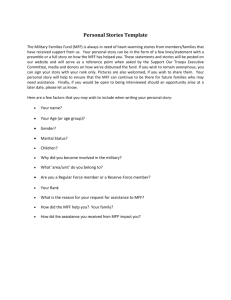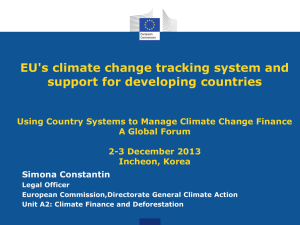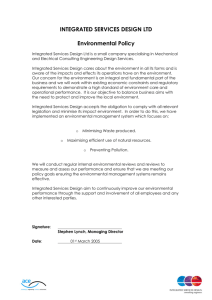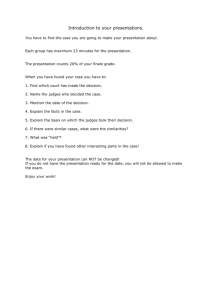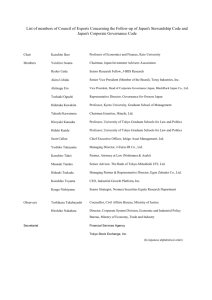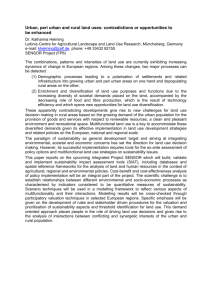Strategic Paper for MFF Ltd
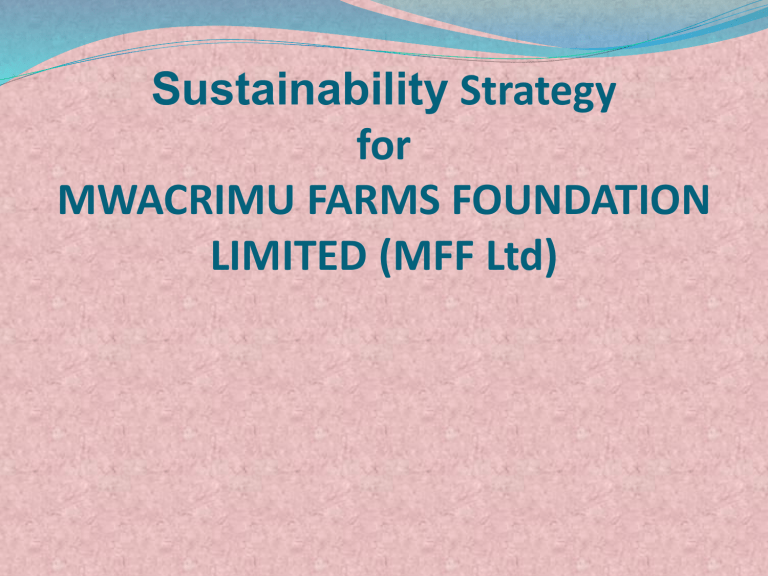
Sustainability Strategy for
MWACRIMU FARMS FOUNDATION
LIMITED (MFF Ltd)
Key Concepts and Approaches
What is Sustainability?
I.
Organizational sustainability , which refers to the capacity of institutional arrangements to continue to provide a framework through which institutional goals and objectives can be met.
II.
Financial sustainability , which refers to the ability to generate resources from a variety of sources, which, over time, reduces an institutions vulnerability to sudden shifts in access to finance.
III.
Impact sustainability refers to the endurance of results of intervention beyond the period of such intervention.
Social Entrepreneurship
MFF Ltd will move towards incorporating social entrepreneurship within its sustainability strategy.
Social entrepreneurship is a relatively new phenomenon that has emerged and created opportunities for individual and institutional identity that combines both social and financial objectives. This is a step beyond operating as a traditional nonprofit that relies solely on external grants and donor support for revenue (Dart, 2004; Dees, Emerson, & Economy,
2001).
An increasing number of Non-Governmental Organisations are buying into the concept and are incorporating social entrepreneurship into their development service delivery. They are engaging their target groups, funders and all other stakeholders as service providers with a clear value proposition.
Resources are then mobilized from this angle and utilized in a manner that helps integrate the poor into the normal economic grid.
Because the poor are enabled to access financial and other resources, they are able to contribute towards addressing identified developmental challenges and thereby possess a greater sense of ownership of the process and outcomes.
Structure of the Sustainability Strategy
• Overall strategy for attaining targeted levels of financial sustainability.
• It is intended to be read in conjunction with the institution’s strategic plan.
• In order to operationalize the strategy contained in this document, separate annual Resource Mobilisation Implementation Plans will be prepared. These plans will be integrated into the institutions annual work plans
Basis for Preparation of the Sustainability Strategy
• O rganizational sustainability is not only a tough challenge for the institution, but also a long-standing issue that Mwacrimu Farms Foundation Limited (MFF Ltd)needs to address.
• The operations of MFF Ltd have until now been funded by a single donor
• Accessing funding is often associated with adherence to strict and sometimes difficult operational guidelines, tight timeframes, sometimes unclear policies and often hefty documentation.
• Mwacrimu Farms Foundation Limited (MFF Ltd) sees the need for innovative approaches that would assist in reducing dependency on one source of funding and enhancing prospects for tapping into local and also non-traditional sources.
Objectives
Specific objectives of the sustainability strategic include the following:
To develop and strengthen capacity to mobilise resources from diverse sources in order to enhance institutional and financial sustainability.
To enhance the culture of managing institutional resources in a sound, accountable and sustainable manner.
Specific Sustainability Strategies
MFF Ltd will draw on its experience in programming and meeting needs of the stakeholders and use this to demonstrate competence to partner with funding and other institutions, thereby expanding its funding base.
MFF Ltd will seek to demonstrate its relevance by ensuring that project proposals and other documentations show clear understanding of underlying developmental challenges and best practices in addressing them.
MFF Ltd will seek to tap into resources from a broad range of sources, including international agencies, local organisations, public and also private sectors as well as business opportunities.
MFF Ltd will develop a mechanism for managing relations in such a way that they are sustained into the long term and so that these can assist in drawing in other partners.
Outputs i.
Partnerships and collaborations well documented.
ii.
Prudent financial management and utilization of resources institutionalized.
Resource mobilization plan developed and operationalized.
iii.
iv.
Business plan developed and implemented.
Outcomes i.
Improved collaborations and partnerships.
ii.
Partnership agreements and signed MOUs.
iii.
Strengthened autonomy of the organization.
iv.
Diversified funding base to include donors and self financing ventures.
i.
Activities
Establish a resource mobilization team that includes the Board and
Management; ii.
Assess resource needs of MFF Ltd.
iii.
Develop a resource mobilization plan; iv.
Orient staff in sound financial management practices; v.
Train staff in resource mobilization; vi.
Develop a partnership policy; vii.
Prepare a register of partners; viii.
Identify & Sign MOUs with selected partners ix. Assign responsibilities for managing partnerships and collaborations; x. Assess the performance of the partnerships and collaborations; xi. Strengthen financial management procedures; xii. Train staff in business and investment management; xiii. Develop an investment policy, strategy and plan; and xiv. Implement an investment plan.
xv. Train staff in Nutrition , Processing and Value Addition to produce.
xvi. Enhance Agricultural Diversification of Crops.
Roles, Responsibilities and Processes for the Implementation of the Sustainability Strategy
It is important to recognise that successful implementation of this sustainability strategy will require that all
The various parties to it fully appreciate the different roles, responsibilities and processes involved.
Roles and Responsibilities i.
The Advisory Board
The Advisory Board are the custodians of the overall MFF Ltd global vision and mission. Because of this role, they will retain the responsibility to provide guidance on all major processes that have a bearing on the overall global vision and mission.
The Advisory Board have an oversight role over MFF Ltd Zambia. They have fiduciary responsibility over the
Institution and are therefore expected to function in such a manner as to ensure that the institution operates within its objectives, core values, established norms, laws and practices.
ii.
The Advisory Board Sub-Committees
Advisory Board sub-committees will play an important role in ensuring that Advisory Board responsibilities are carried out successfully. This is primarily because they can be organised into workgroups that assist in executing decisions made at Advisory Board meetings. They also allow for co-opting in (on long and short term basis) of individuals with specific skills needed at various points of execution.
MFF Ltd will include, amongst these working committees, one that is dedicated to institutional sustainability and resource mobilisation. The committee will report to the meeting of the National Advisory Board under a standing agenda item that will constantly review sustainability and resource mobilisation strategies and activities.
iii. The Programs Director
The Programs Director, who will be a member of the National Advisory Board and serve as
Secretary, will play an important co-ordinating role between the National Advisory Board and the
Institution / Organisation.
The position will be important in ensuring successful institutionalisation of all issues emerging from board meetings and also in ensuring that all relevant strategy and operational issues are brought to the attention of the National Advisory Board.
An equally important role will be to ensure that, in its engagement with internal and external stakeholders, the institution projects a clear brand based on the organisation, its programmes and the philosophies underpinning them.
iv. Programmes Management
As the institution’s engine, the Programmes Management Unit will play a critical role in the overall sustainability of MFF Ltd. They will carry the brand beyond the institution through the products being implemented and the manner in which this is done. This has a significant impact on stakeholder perceptions and the form and nature of relationships that could be built as a result.
Programme Staff will therefore have an important responsibility in demonstrating that MFF Ltd can be a trusted partner in development service delivery. Such demonstration will primarily be linked to the quality of service delivery, but will also include deliberate efforts to make The
Organisation and its work known to all as various opportunities present themselves.
v.
Resource Management
Key institutional resources include personnel, information / knowledge, time and finances (just to list a few).
The management of these resources will be critical to sustainability at all levels - organisational, financial and impact. Appropriate systems and procedures and a culture of ensuring sound resource management enables the attainment of higher levels of performance. The fact that an institution can get more from available resources in itself enhances sustainability. But even further a demonstration of sound resource management practice is able to attract more resources, making the institution even more sustainable.
MFF Ltd will ensure that the most appropriate policies, procedures, systems and personnel are in place to ensure optimal resource management. Key management areas will include the following: i. Human Resource – including development, performance management, etc ii. Knowledge Management
– including the use of appropriate Information and Communication Technology (ICT) to enhance Monitoring, Evaluation and Learning (MEL). This needs to be linked to organisational communication channels and processes that ensure effective circulation of relevant knowledge and information to maintain a unified vision and ensure all parties in the organisation are “on the same page”.
iii. Time Management
– ensuring a culture that projects a clear and deliberate regard for time as a resource that needs to be managed.
iv.Financial Management – appreciation of the fact that the value of finance is in its catalytic nature, enabling better results. Sound financial accountability practices are particularly critical because the largest proportion of finances will emanate from outside the organisation.
Performance Management Systems
An institution-wide performance management mechanism has been instituted. This will be strengthened to ensure that performance at different levels is being monitored and evaluated against attainment of set targets and progression towards overall institutional objectives.
The Institutional Development Framework (IDF) developed under the Local Partner Capacity Building (LPCB) Project (a
USAID-funded programme) will be employed for this purpose.
Key components of these performance systems will include the following: i.
Board Performance Management
A self-evaluation mechanism will be instituted through which the National Advisory Board will evaluate its own performance.
They will also benefit from input / feedback from the International Advisory Board. The evaluation mechanism will have an annual cycle but will be broken into quarterly monitoring components that will be dealt with at each Advisory Board meeting.
ii.
Human Resource Performance Management System
Personnel constitute the most important resource for MFF Ltd, an HR performance management system is intended to ensure that personnel are accorded with an environment in which they can bring out their full potential and be rewarded for doing so.
iii. Monitoring, Evaluation and Learning (MEL) System
The MEL system will focus on the programmes management but will also be linked to the Board performance and the resource management systems.
This system will assist MFF Ltd in ensuring that programmes are well-targeted to achieve overall institutional goals and objectives, and that clear indicators are developed to help measures progress being made.
iv. Resource Management System
The management of the various resources (especially HR, knowledge, time and finances) will require distinct and yet integrated systems that assist in producing optimal institutional results. Transparency and accountability will be the hallmark of these systems.
Strategy Implementation Plan
Below is a schedule summarizing specific steps that will need to be taken within the first year for this sustainability strategy to be effected and to begin to demonstrate results by the end of the first year of implementation.
# Description Completion Date Responsible Person
1 Approval of Sustainability Strategy
2
3
4
5
6
Approval of Resource Mobilisation Plan
Revision of Strategic Plan to incorporate Sustainability
Plan
Preparation/Revision of Work plan to incorporate
Resource Mobilisation Plan
Implementation of major governance and institutional management changes to MFF Ltd.
Development of the first 5 new formal relationships with institutions identified under Stakeholder Analysis
Finalisation of the first 3 partnership proposals 7
8
9
Signing of the first Partnership Agreement arising from resource mobilization efforts
Development of an additional 5 new formal relationships
10 Signing of another 5 new Partnership Agreements
Conclusion
This document provides a roadmap for enhancing MFF Ltd’s financial sustainability. The focus has been on the development of sustainable relationships that would, in turn, open doors for accessing resources that are required by the institution as it implements its strategic plan.
Also discussed are matters that will require realignment of internal institutional structures and processes so that MFF Ltd can be in a position to forge ahead the envisaged relationships.
The sustainability strategy is also intended to be linked to annual resource mobilization plans that will be part of the overall MFF Ltd Annual Work Plans.
Clear and committed leadership from the Advisory Board will be paramount in ensuring successful implementation of this sustainability strategy. Such leadership will set the platform around which staff and other partners will also engage and support the set objectives.
Stakeholder Mapping & Analysis
# CATEGORIES
1 International
Development
Agencies
TYPE
UN
Agencies
Foreign
Government
Agencies
NAME
UNHCR & IOM
UNDP & WFP
WHO
ILO
UNICEF, UNFPA,
FAO
USAID
Finnish Gov
Swedish
AREA OF ENGAGEMENT
UNHCR is an important reference point for relationships with other institutions. IOM addresses issues related to human displacement other than through crises.
UNDP is probably the most important UN agency to deal with. They are very strong in making markets work for the poor (MMW4P) and are currently managing the funds for Global Fund for HIV/AIDS/TB/Malaria.
WFP is well-known to respond quickly to emergency human situations such as the ones AAH has a lot of experience in.
Engagement with WHO may be best suitable for health-related advocacy, especially with regard to access to health for rural inhabitants. This could be linked to projects with GRZ. WASHE remains an important area for
WHO and many actors in health.
ILO has interest in issues relating to exploitation of the vulnerable through unjust labour practices (especially women and children). MFF Ltd can design programmes around this area but targeting agricultural labourers and peri-urban/urban dwellers that are effectively economic refugees and are being exploited as labourers
AAH-I has, in some of its other countries of operation, successfully partnered with these agencies in carrying out its programmes. MFF Ltd will explore potential opportunities to partner with them in their respective areas of interest.
The Obama gov . launched “Feed The Future” (FTF) initiative. Many
USAID projects will be aligned to this Agricultural initiative focusing on
Food and Nutrition security. PEPFAR will no longer be the main thrust for
USAID. AAH needs to develop agri-based empowerment projects to take advantage of the opportunities presented by FTF.
Still involved with governance. May do more as decentralisation drive gains momentum. Also developing large environmental programme and a bit of money going to community-based enterprise development. Also supporting PLARD II in Luapula province, an agri-business development programme.
SIDA is very active in private sector development, supporting inclusive market development and access to finance. Agricultural finance and entrepreneurship may be a possible area for MFF Ltd to engage with them.
EU They have been pumping a lot of funds into GRZ.
Opportunities may exist in identifying ways of partnering with
GRZ in implementing some of these project.
JICA, Irish AID, CIDA,
DFID
These represent a pot of agencies that may not appear very active in Zambia but could respond to good initiatives. DFID supports innovative ideas, especially those that help open up rural markets. They actually even have an innovation challenge fund.
The is an AU-led initiative that is focusing on agricultural development, nutrition & food security and poverty reduction. It is likely to work very closely with FTF and will involve a number of activities that could be funded from various sources.
Comprehensive
Africa Agriculture
Development
Programme
(CAADP)
International NGOs and other private sector implementers of development activities
CARE, World Vision and other INGOs
Africare
Foreign Research
Institutions
These represent institutions that often have very specific themes and geographical focus per project. AAH can support specific aspects of these projects through partnerships that help them implement. This is the only likely level of collaboration
Africare is known to provide fairly sizeable grants ($150,000 and more) and is active in rural agri-business development.
They are also keen on innovative mechanisms for rural markets stimulation.
Several research institutions have set up shop in Zambia.
World Fish centre, Michigan State University, and various centres for research.
International Institution for Tropical Agriculture
Though they have been around since the late 1960s, there doesn’t appear to be much publicity about them. But this may be good to AAH as there might be limited competition.
Abt, ACDI/VOCA and other international organizations
They are pre-approved American Government/USAID contractors, and have access to the large USAID grants not open to non-prequalified suppliers. They often need implementing partners. Identifying others in this category that we could approach would also be helpful
# CATEGORI
ES
2 Local
Development
Agencies
3
4
International
Corporations
Local
Corporations
TYPE NAME AREA OF ENGAGEMENT
Luapula
Foundation
Family Health
Trust
Development
Opportunities for
People
Empowerment
Zambia
Governance Fund
Civil Society for
Poverty Reduction
Civil Society
Environment Fund
Chinese Corporations
They have received over $3m under PEPFER but are struggling to get more. They have the name and experience. Based in
Mansa
They have been around for over two decades. They may be a good partner to work with, especially in health, as a way of confirming that MFF Ltd is a local player
They are based in Mpika and have received significant funding for rural projects. May be good to tap into their network through collaboration
Though it is uncertain how long this fund may continue, they seem to be going beyond the traditional understanding of governance and are supporting empowerment initiatives that extend services to the unreached.
This is a very powerful and well-known institution though they may be running out of new ideas.
International Mining Companies with interests in Zambia
Foreign Companies in Agriculrture
Providers of
Consumable
Shoprite, NMC,
Chinese firms and their government may presently be very keen to show their human side. Approaching them with a clear value proposition may yield much
With the current discussions on super-normal profits, windfall tax and externalisation of revenues, these firms may be in a similar position to
Chinese firms
There is growing interest in African Agriculture. Northern European companies are likely to increase. Strategic linkages may be forged around agri-business projects.
These can be targeted for feeding programmes. There need for this to be so well planned as to respond to their need for publicity and disposal of excess or expiring commodities. MFF Ltd will further explore opportunities to have them as potential outlets of agricultural fresh produce from the communities it works with in place of imports, thus creating markets for its community agricultural producers.
4 Local
Corporations
5 National
Government
Agencies
Providers of
Consumable
Providers of
Assets
Golden Valley Agricultural
Research Trust
Ministry of Health
Shoprite, NMC,
ZSIC, Banks,
Toyota
Providers of
Facilities &
Technical know
Agricultural
Businesses
Financial
Institutions
ZDA, CEEC, Youth Development Fund
Ministry of Chiefs Affairs
Ministry of Agriculture
These can be targeted for feeding programmes. There need for this to be so well planned as to respond to their need for publicity and disposal of excess or expiring commodities. MFF Ltd will further explore opportunities to have them as potential outlets of agricultural fresh produce from the communities it works with in place of imports, thus creating markets for its community agricultural producers.
These can provide computers, furniture, vehicles and other items which, whilst not needed to them, would be valuable to MFF Ltd
Zambia programmes.
These may have facilities in rural areas that could be utilised for programme implementation. Office space, warehousing, vehicles.
Could also avail personnel to facilitate activities as part of their corporate social responsibility. MFIs could be particularly strategic.
Access to empowerment support (funding and training, etc) remains a challenge for rural inhabitants. MFF Ltd could work with rural agri-producers and others to improve awareness of available facilities and also lobby these agencies to expand their rural outreach and improve appropriateness of products and service delivery. Funding for such activities could come from agencies such as JICA, Finnish, etc
They are a government agency but regularly access funding from various sources. They may need community-based actors to assist them implement applied research projects.
It would be strategic to be a “first mover” in engaging with this new ministry around culture and development.
It has been identified that agricultural camp extension officers are often not exposed to on-going training. A project that targets these can be designed, with the justification that they are most critical for transferring know-how to rural peasant farmers.
Probably the best linkage could be with the District Health Management
Teams (DHMT). Joint activities could be developed and used to obtain funding. They would provide the facilities (buildings and vehicles) and personnel. AAH would provide the technical knowhow.
6
8
Local and
Foreign
Individuals
Community
Members
9 Volunteers and
Interns
Andrew Young
Foundation
Kenneth Kaunda
Nelson Mandela
Foundation
Members of Cooperatives
Individual Commercial Farmers
They have offered $5m grant before and may still be willing to provide it. Andrew Young is very good friends with Former
President Kenneth Kaunda
Though they may not have much funding, they would be a strategic partner to consider as their brand can unlock other doors
Mandela may have outgrown South Africa and the Foundation may be willing to consider doing a regional project.
Cooperatives are already organised groups with valuable social capital that can be tapped into for programme implementation
Commercial farmers have radiated into various rural parts and may be keen to engage in community project so as to secure their own interests
Foreign
Volunteer
Organisatio ns
VSO, Peace Corps,
Global Health Corps
Foreign Institutions that may be willing to avail individuals
Religious groups/chur ches
These are strategic partners as they can not only avail HR but also open other doors for resource mobilisation from the volunteers’ networks
Small Christian
Community Parishes e.g. Mary Immaculate
Large corporations and learning/research institutions are now active in providing HR. Foreign governments are providing funding to young researchers to spend time in the development sector
These churches typically have groups and committees that engage in voluntary services within their communities and possibly on a broader scale. Their involvement may be attained in the capacity of spreading their reach beyond their communities possibly to their rural counterparts.

